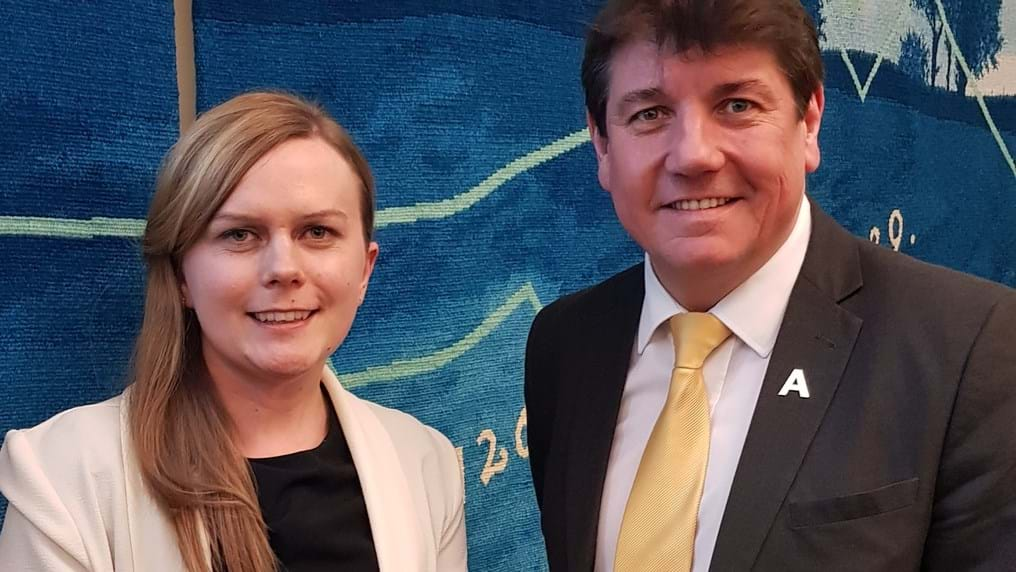Briefing note to MPs on chemical weapons published one year on from Salisbury Novichok poisoning

11th March 2019
University of Leeds’ chemical engineering postgraduate Jeni Spragg has produced a report to help UK parliamentarians make evidence-based decisions on chemical weapons policy.
It follows on from the UK Government’s Defence Secretary announcing an additional £11m funding to bolster the UK’s ability to identify chemical weapons threats and combat them. A Novichok nerve agent was used in Salisbury on 4 March 2018 to poison Sergei Skripal and his daughter Yulia Skripal. They were both admitted to hospital in a critical condition. A police officer at the scene, Nick Bailey, was also taken to intensive care.
Jeni Spragg, a postgraduate student in bioenergy at the University of Leeds, produced the briefing note for policymakers after being awarded the Ashok Kumar Fellowship in 2018 by the Institution of Chemical Engineers (IChemE) and the UK Parliamentary Office for Science and Technology (POST).
She spent three months at POST researching and writing the briefing note (POSTnote), which included interviewing over 20 experts from government departments, academia, industry, learned societies, think tanks and NGOs. Her report, Chemical Weapons, gives an overview of types of chemical weapons, how they can be deployed, and their effects on human health and the environment. It also gives an overview of chemical defence in the UK, including the measures in place to prevent, respond to and recover from chemical weapons attacks.
Spragg gave policymakers and members of the Parliamentary and Scientific Committee a taster of her findings at a recent meeting held at the Houses of Parliament on 25 February. The meeting, entitled ‘What did we learn from Salisbury?’ was chaired by Stephen Metcalfe MP and also welcomed Professor Les Baillie from Cardiff University, who discussed the increasing threat of bioterrorism and biological weapons.
Spragg discussed the current policies in place for controlling chemical weapons, governed by the Organisation for the Prohibition of Chemical Weapons (OPCW). Novichoks are a class of nerve agents that present particular challenges, as they are not listed in the Chemical Weapons Convention (CWC), and no state has ever declared having them.
Jeni Spragg said:
“It was a unique opportunity to speak about my POSTnote at the Parliamentary and Scientific Committee meeting. The meeting attendees had some interesting viewpoints about the role of the Chemical Weapons Convention and the Organisation for the Prohibition of Chemical Weapons; particularly in terms of how they stay relevant in the future.
“My time at POST was a fantastic, hands-on experience. In three months, I learnt so much about how parliament works and had the opportunity to speak to key policymakers and parliamentary advisors. It really opened my eyes to the important role and expertise that chemical engineers, and others with STEM expertise, can play to help MPs make evidence-based decisions on policy issues. I’m grateful for everything I’ve learned through the Ashok Kumar Fellowship.”
Dr Lorna Christie, Physical Sciences and IT Adviser, POST said:
“Working alongside Jeni for three months on this timely and interesting topic has been a pleasure. Jeni used her academic rigour to review evidence in the area and honed her science communication skills in writing her research up in an accessible way.
“Our POSTnote is an impartial and engaging summary of chemical weapons that can be used by parliamentarians, academics and the general public wanting to know more about this significant area. POST fellowships are an excellent way for PhD students to experience first-hand how parliament works and develop skills that they can carry with them in their future career.”
Claudia Flavell-While, IChemE Director, Learned Society, added:
“Jeni’s work in this fellowship is an excellent example of the valuable expertise of chemical, biochemical and process engineers in providing solutions to national policy issues on contentious topics; in this particular case, chemical weapons.”
Image
Left to right: Ashok Kumar Fellow 2018 Jeni Spragg and MP Stephen Metcalfe at the Parliamentary and Scientific Committee meeting
Links
POSTnote 596 – Chemical Weapons
Previous POSTnotes by chemical engineers
UK Parliamentary Office for Science and Technology (POST)
Contact
For more information please contact:
Rachael Fraser, Communications Executive, IChemE
t: +44 (0) 1788 534435
e: rfraser@icheme.org
Ketna Mistry, Communications Executive, IChemE
t: +44 (0) 1788 534484
e: kmistry@icheme.org
Lef Apostolakis, Communications Manager, UK Parliamentary Office for Science and Technology
t: +44 (0)20 7219 8973
e: apostolakisl@parliament.uk
What is chemical engineering?
Chemical, biochemical and process engineering is the application of science, maths and economics in the process of turning raw materials into everyday, and more specialist, products. Professional chemical engineers design, construct and manage process operations all over the world. Oil and gas, pharmaceuticals, food and drink, synthetic fibres and clean drinking water are just some of the products where chemical engineering plays a central role.
IChemE
The Institution of Chemical Engineers (IChemE) advances chemical engineering's contribution worldwide for the benefit of society. We support the development of chemical engineering professionals and provide connections to a powerful network of around 37,000 members in 100 countries.
We support our members in applying their expertise and experience to make an influential contribution to solving major global challenges, and are the only organisation to award Chartered Chemical Engineer status and Professional Process Safety Engineer registration.
More information: www.icheme.org
UK Parliamentary Office for Science and Technology (POST)
UK Parliamentary Office for Science and Technology (POST) is the UK Parliament's in-house source of independent, balanced and accessible analysis of public policy issues related to science and technology. POST's aim is to help parliamentarians examine science and technology issues effectively. By writing briefings, organising events and assisting Select Committees, POST has supported parliamentarians in their decision-making since 1989.
More information: www.parliament.uk